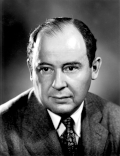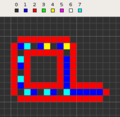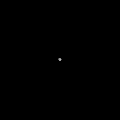they were used in von Neumann's universal constructor. Nobili cellular automaton is a variation of von Neumann's cellular automaton, augmented with the...
13 KB (1,613 words) - 19:47, 17 January 2025
stochastic cellular automaton and asynchronous cellular automaton. The concept was originally discovered in the 1940s by Stanislaw Ulam and John von Neumann while...
66 KB (8,097 words) - 09:50, 17 June 2025
ruleset. Artificial life Cellular automaton Conway's Game of Life Langton's loops Von Neumann cellular automaton Wireworld von Neumann, John; Burks, Arthur...
7 KB (593 words) - 10:33, 5 October 2024
neighborhood is named after John von Neumann, who used it to define the von Neumann cellular automaton and the von Neumann universal constructor within it...
4 KB (407 words) - 10:47, 26 August 2020
John von Neumann's universal constructor is a self-replicating machine in a cellular automaton (CA) environment. It was designed in the 1940s, without...
25 KB (2,555 words) - 11:16, 16 May 2025
initial configuration of cells. The Von Neumann universal constructor based on the von Neumann cellular automaton was fleshed out in his posthumous Theory...
208 KB (23,706 words) - 13:12, 19 June 2025
assignment von Neumann cellular automaton von Neumann conjecture Murray–von Neumann coupling constant Jordan–von Neumann constant von Neumann's elephant von Neumann...
4 KB (349 words) - 06:02, 11 June 2025
self-replication The Von Neumann cellular automaton This disambiguation page lists articles associated with the title Von Neumann machine. If an internal...
561 bytes (107 words) - 12:49, 13 September 2020
John von Neumann. The same name may also refer to quantum dot cellular automata, which are a proposed physical implementation of "classical" cellular automata...
10 KB (1,334 words) - 06:51, 7 June 2024
In a cellular automaton, a gun is a pattern with a main part that repeats periodically, like an oscillator, and that also periodically emits spaceships...
3 KB (289 words) - 05:40, 17 August 2023
A reversible cellular automaton is a cellular automaton in which every configuration has a unique predecessor. That is, it is a regular grid of cells,...
71 KB (9,018 words) - 09:59, 18 October 2024
In cellular automata such as Conway's Game of Life, a breeder is a pattern that exhibits quadratic growth, by generating multiple copies of a secondary...
32 KB (180 words) - 00:53, 22 May 2025
Langton's loops (category Cellular automaton rules)
In 1952 John von Neumann created the first cellular automaton (CA) with the goal of creating a self-replicating machine. This automaton was necessarily...
11 KB (1,021 words) - 19:53, 25 April 2025
Seeds is a cellular automaton in the same family as the Game of Life, initially investigated by Brian Silverman and named by Mirek Wójtowicz. It consists...
4 KB (434 words) - 08:38, 18 October 2024
In cellular automata, a methuselah is a small "seed" pattern of initial live cells that take a large number of generations in order to stabilize. More...
4 KB (282 words) - 21:40, 25 April 2025
A cyclic cellular automaton is a kind of cellular automaton rule developed by David Griffeath and studied by several other cellular automaton researchers...
10 KB (1,224 words) - 16:56, 2 April 2024
the new states influence other cells. In contrast, an asynchronous cellular automaton is able to update individual cells independently, in such a way that...
9 KB (1,248 words) - 17:24, 22 March 2025
Conway's Game of Life (category Cellular automaton rules)
working within a cellular automaton with a small neighbourhood (only those cells that touch are neighbours; for von Neumann's cellular automata, only orthogonal...
56 KB (6,408 words) - 13:52, 19 May 2025
cellular automaton similar to Conway's Game of Life. It was devised in 1994 by Nathan Thompson. It is a two-dimensional, two-state cellular automaton...
4 KB (444 words) - 17:25, 11 June 2025
In a cellular automaton, a finite pattern is called a spaceship if it reappears after a certain number of generations in the same orientation but in a...
5 KB (495 words) - 18:32, 27 May 2025
In a cellular automaton, a finite pattern is called a sawtooth if its population grows without bound but does not tend to infinity. In other words, a sawtooth...
4 KB (406 words) - 01:36, 8 February 2022
Wireworld (category Cellular automaton rules)
implemented as a cellular automaton. von Neumann's cellular automaton Dewdney, A K (January 1990). "Computer recreations: The cellular automata programs...
3 KB (272 words) - 05:46, 2 April 2025
In a cellular automaton, an oscillator is a pattern that returns to its original state, in the same orientation and position, after a finite number of...
4 KB (454 words) - 00:04, 24 March 2025
been devised in analogy to conventional models of cellular automata introduced by John von Neumann. Any device designed to represent data and perform...
23 KB (3,257 words) - 18:27, 21 November 2024
Self-replicating machine (redirect from Von Neumanns)
be able to evolve and which he formalized in a cellular automata environment. Notably, Von Neumann's Self-Reproducing Automata scheme posited that open-ended...
45 KB (5,231 words) - 08:03, 1 June 2025
configuration of von Neumann cellular automata, and the computational throughput is increased. In von Neumann's original cellular automaton, the crossing...
3 KB (446 words) - 05:53, 17 May 2023
CoDi (redirect from CoDi Cellular Automata)
CoDi is a cellular automaton (CA) model for spiking neural networks (SNNs). CoDi is an acronym for Collect and Distribute, referring to the signals and...
10 KB (1,210 words) - 11:53, 4 April 2024
Universal Turing machine (redirect from Turing-Complete Von Neumann Machine)
computing devices Von Neumann universal constructor – Self-replicating cellular automaton From lecture transcript attributed to John von Neumann, as quoted by...
22 KB (2,963 words) - 22:01, 17 March 2025
A rake, in the lexicon of cellular automata, is a type of puffer train, which is an automaton that leaves behind a trail of debris. In the case of a rake...
6 KB (629 words) - 17:12, 20 October 2023
Automata theory (redirect from Automaton theory)
of automaton. This automaton consists of states (represented in the figure by circles) and transitions (represented by arrows). As the automaton sees...
32 KB (3,851 words) - 14:40, 16 April 2025




















